Now Reading: India Rejects ‘Illegal’ Arbitration on Indus Waters Treaty, Calls It a Charade Driven by Pakistan
-
01
India Rejects ‘Illegal’ Arbitration on Indus Waters Treaty, Calls It a Charade Driven by Pakistan
India Rejects ‘Illegal’ Arbitration on Indus Waters Treaty, Calls It a Charade Driven by Pakistan

India has strongly objected to the ongoing arbitration process over the Indus Waters Treaty, calling the move “illegal” and accusing Pakistan of misusing international legal forums for political gain. The government stated that it does not recognise the authority of the so-called court of arbitration, which it claims was set up in violation of the treaty’s dispute resolution mechanism.
What Is the Indus Waters Treaty?
Signed in 1960 between India and Pakistan with the help of the World Bank, the Indus Waters Treaty governs the sharing of six rivers in the Indus basin. Under the treaty, India was granted control over the eastern rivers (Ravi, Beas, Sutlej), while Pakistan received the western rivers (Indus, Jhelum, Chenab), though India has certain rights for limited use of the western rivers too.
This treaty has remained functional even during major Indo-Pak conflicts, but recent disputes have tested its resilience.
The Current Dispute
Pakistan has raised objections to India’s hydroelectric projects on the Kishanganga and Ratle rivers in Jammu and Kashmir, alleging treaty violations. Instead of resolving the matter through the agreed-upon method of appointing a neutral expert, Pakistan pushed for the establishment of a court of arbitration.
India, which had earlier agreed to neutral expert review, views this move as unilateral and inconsistent with the treaty’s terms. It has accused Pakistan of bypassing the agreed process and attempting to internationalise the issue unnecessarily.
India’s Position and Global Implications
India’s Ministry of External Affairs has clearly stated that the so-called arbitration court lacks legitimacy and that its proceedings are not binding. Officials argue that allowing parallel processes — one led by a neutral expert and the other by arbitration — creates confusion and violates the treaty’s intent.
India has also warned that such actions set a dangerous precedent for politicising international treaties. Analysts believe the issue may have long-term implications on how global water-sharing treaties are interpreted and enforced.
Relevance to Indian Citizens and Tier 2 Cities
Water security is a growing concern in many Indian cities, including Tier 2 urban centres like Amritsar, Ludhiana, and Jammu — all of which are close to the Indus basin. Any disruption or misuse of the treaty can impact irrigation, drinking water supply, and regional development projects.
Additionally, residents in these areas are closely watching diplomatic developments, as river projects directly affect agriculture and employment.
Conclusion
India’s rejection of the court of arbitration on the Indus Waters Treaty marks a firm stance against what it sees as an abuse of international legal mechanisms. While the underlying issues remain unresolved, New Delhi’s message is clear — treaty terms must be respected, and disputes must follow the agreed channels. For citizens and policymakers alike, ensuring fair and secure access to water remains a priority that goes beyond politics.

























